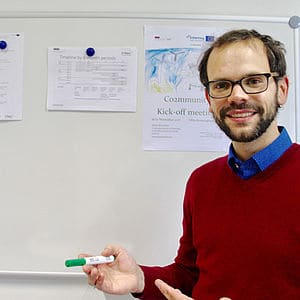The Co2mmunity project wants to bring forward renewable community energy. The project coordinator at Kiel University explains what this is all about. Co2mmunity is one out of 39 cooperation projects which are starting their work for a more innovative, more sustainable and better accessible Baltic Sea region in autumn 2017.
What do you mean by renewable community energy?
Fabian Faller: The whole idea of community energy is that local people use their own resources, i.e. finances, time and knowledge, to provide the community in which they are living with renewable energy that they produce themselves. This idea typically refers to a number of households producing energy jointly for their own consumption, e.g. by jointly setting up a wind park. If all households had sufficient energy from their own production that would be great. However, industry needs energy as well, and this could be excess energy from local communities. So the potential for community energy projects is great.
And what do you do in the project?
Fabian Faller: In the partner regions of our project we are developing what we call renewable energy cooperative partnerships, or RENCOPs. Our partner organisations use a lot of the funding to hire street workers who get the equipment and time to go out and inform citizens about the opportunities of renewable energy production. They organize local events where they demonstrate to regular people and local decision makers the financial potentials of renewable energy and they point out options to form partnerships.
Are communities interested in renewable energy production?
Fabian Faller: There is big variety in the Baltic Sea region. In Denmark and Germany community energy is well developed. There are numerous German energy cooperatives. This is a specific legal entity, a cooperative business scheme in which people have the same share and the same say, independent of the amount of money they actually invest. Together they set up projects such as bio gas, photovoltaic or wind power plants to produce electricity or local district heating systems. Roughly 50 % of all renewable electricity generation in Germany is held by such community projects. In Finland there is a long history of citizens cooperating in the heating sector. In disperse settlements, people always had to team up and develop heating systems together. There, it’s rather an idea of togetherness and community. In other regions, e.g. in the Baltic states or Poland there is not really much awareness of this particular type of energy production and so we thought the idea needed to be promoted.
Why do you need a transnational project for this sort of local work?
Fabian Faller: On the one hand, the project is about motivating people on the local level: we bring together the local people and develop blueprints and strategies on how to set up RENCOPs in the local or regional context of our project partners. On the other hand, people from different regions learn from each other, because we establish regular exchange among the RENCOPs. So we need more advanced and less advanced regions to have an effect – and we find them in different countries. In addition, we want to dive a bit into research: What are drivers and barriers of community renewable energy in specific communities? And on a more practical side, we try to improve the situation for renewable energy deployment based on our observations. We want to look at different situations in different countries to draw meaningful conclusions.
Are there currently any cross-regional structures for community energy in place?
Fabian Faller: No, to our knowledge in the project consortium, there has not been any exchange on this micro scale level. There is BASREC, the Baltic Sea Region Energy Commission, but this is high level policy mainly dealing with connecting grids and building large scale infrastructures. On the micro level like in our project, local people are actually starting to work together. By this, you can create a sense of community and a sense of cohesion. To get to know people that are doing the same in other countries helps bridging borders in many ways, not only in terms of content, but also in terms of particular prejudices which you might have about other countries.
What is your personal motivation to work in the context of Interreg?
Fabian Faller: I think it’s pretty motivating to make your research results immediately usable in practice. Most of the time I receive information from and process it in an academic environment. The Interreg project provides me with a lot of information from the practitioners in the project consortium. At the same time, it enables me to do the academic work: together with our social research oriented project partner we turn observations into solid knowledge. Then, through the project we can immediately feed back our academic analysis to practitioners. This can be a very fruitful process.

Fabian Faller is the project manager of the CO2mmunity project which started in October 2017. He is a researcher at Kiel University and holds a PhD in geography. Fabian has worked on local climate mitigation concepts in Germany and developed local strategies on how municipalities can make use of renewable energies. Nowadays he is convinced: “You can produce many many pages of strategic papers, but if you want to implement renewable energy strategies you need to actually build a renewable energy plant, make it produce electricity and connect it to a grid – this is implementation.
Interview: Mona Farnisa (Interreg Volunteer Youth) & Stefanie Maack



